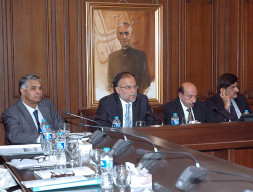
The federal government has put energy security at the top of its development agenda in its Vision 2025. While energy certainly needs prioritised attention, it should be integrated with water and food security of the country. Over the last few decades, modern technologies in water, energy and agriculture have created dependencies such that the three sectors have become intimately connected. Water generates electricity in hydropower plants, cools thermal power and nuclear power plants, and is used to mine coal and extract oil and gas. Energy is increasingly being used to desalinate saline water and to distribute water in urban piped networks. Food production also increasingly requires energy to pump groundwater and process agricultural produce. Natural gas is consumed in manufacturing nitrogen fertilisers that are used for boosting crop production. These interconnections, often called the ‘water-energy-food nexus’, are increasing in significance as demands grow with an exponentially increasing population while resources remain constrained.
Failure to recognise and incorporate these issues in infrastructure development decisions can lead to adverse outcomes. Recent events are sounding alarm bells for decision-makers to take heed. In 2009, France had to shut down one-third of its nuclear power capacity located on inland rivers due to a heat wave that caused disruptions in cooling. In China, the water shortage in its north has slowed development of coal-to-liquid projects that are needed to meet the country’s energy demands.
A number of corporations, international agencies and governments are now engaged in a scenario planning to consider the impacts of this water-energy-food nexus on future operations and economic implications. While recognition of the interconnections is important at a global level, information about local resources and established infrastructure is needed for informing national policies. In Pakistan, water and energy have traditionally been interlinked through hydropower plants and large multipurpose dams. However, new interactions have emerged between water, energy and agriculture sectors that are poorly understood.
Crop production in the heartlands of Pakistan — served by a massive network of canals — now increasingly relies on energy consuming groundwater pumps to meet irrigation needs. A million tube wells are reportedly installed in Punjab alone, and energy use in pumping and farm operations may account for up to one-fifth of the province’s energy consumption. This link between energy, irrigation water and agriculture needs to be investigated with improved data collection and policy action.
The coal deposits of Thar in Sindh promise energy supply on one hand, but will place demands on water resources in the arid region on the other. The new hydropower plants, currently under development in Khyber-Pakhtunkhwa, will further enmesh energy and water. For systems that are expected to function for decades to come, the implications of water and of energy must be evaluated if future water supplies in the Indus and its tributaries get affected due to climate change or face disruptions in flow across national boundaries. The use of multipurpose dams should be assessed for the economic tradeoffs that result between ensuring food security (by prioritising supply for irrigation demands) versus cheap hydroelectric power that is desperately needed in the industrial and domestic sectors.
Managing each resource separately can lead to decisions that seemingly improve supply in one sector, but in reality, create problems in others. If the linkages are incorporated in policy evaluation, then unintended consequences may be avoided while multiple problems may simultaneously get addressed. Such integrated decision-making will require a combination of three factors: 1) highest level of sustained political commitment of providing long-term energy, water and food security for the nation; 2) cross-sector organisational linkages for information and knowledge exchange, and for joint identification of synergistic policies and plans; 3) collection of accurate and comprehensive information
Equitable and sustainable access to water, food and energy forms the basis of a high quality of life for the citizens of a new and prosperous Pakistan. It is time to put new ways of thinking in place.
Published in The Express Tribune, February 13th, 2014.
Like Opinion & Editorial on Facebook, follow @ETOpEd on Twitter to receive all updates on all our daily pieces.
COMMENTS (10)
Comments are moderated and generally will be posted if they are on-topic and not abusive.
For more information, please see our Comments FAQ


































































@Shabana: As you might know, the principal implementing agency of the government is the bureaucracy, so who do you expect to put pressure on it? If you are inferring that the politicians should make the bureaucrats listen to them, I am sorry you will have to inspect more closely just how the government's decision-making process takes course.
Also, note that most parliamentarians and politicians do not seem to have even a cursory understanding of the critical development issues (for a better understanding of this see related transcripts of the parliamentary debates) which acts as an enabling tool in the hands of the bureaucrats. Add to that, for a variety of reasons though mostly bureaucratic inertia, the recognition, response and implementation lags which are often so wide that projects that ought to take only a few weeks to complete linger on for months, sometimes years and project completion delays are compounded when you throw in the political angularities into the mix.
By the way, I have neither suggested that we not exert pressure on the centers of power nor give up trying, I have only attempted to highlight structural constraints whose rigid and inherent complexity continue to mar Pakistan's economic development.
@Seema: Just because law and order is a problem does not mean that all other problems disappear. We can not continue to live in a one problem at a time world. We have failed at that -- we need to address many, many problems, not just law and order which is a big one indeed, but not the only one.
@Rao: I think the goal should be to put enough pressure on the government so that the bureaucrats start to listen. The government needs to recognize the issue. We are not quite there, but does not mean that we should stop trying.
The top agenda of Govt should be law and order also, before improving law and order situation foreign investment will not be possible as a consequence job creation will also not possible so un-employement ratio will increase creating mayhem in the country.
"1) highest level of sustained political commitment of providing long-term energy, water and food security for the nation". Which politician comes to your mind for making such a commitment?
Your prescriptive advice is not new, a plethora of credible research carried out under the aegis of experts from the World Bank, ADB and multilateral donor agencies has been gathering dust in the hallowed halls of the various government departments for many years now, the critical question is who will implement their findings?
Not only is enduring political commitment necessary, Pakistan needs a bureaucratic apparatus in which the balance of power between bureaucrats and technocrats is rationalized. Unlike in India, Pakistani bureaucrats end up spending inordinate amounts of time in keeping the experts at bay just so that they keep their grip over decision making. We can learn a lesson or two from the Indian experience in this arena where the technocrats enjoy much more respect and autonomy.
@IndianDude: Thats why India is creating scarity of water so that u can put water in your cars as fuel or may be somewhere else. Perhaps, Madam should teach a summer course in a Pakistani university.
Very good article. Water is not only important for farming in pakistan but also as a fuel for future pakistani cars.
This is quite interesting - hope Mr Ahsan Iqbal pays attention!
Brilliant -- we need more of these types of articles. There is too much hot air in the op-ed pages about whether Pakistan would survive, the obituary of the nation and other related nonsense.
Very informative. Good suggestions in the end but let me remind you that the bureaucratic machinery is too rigid to change its ways, so expect no change.